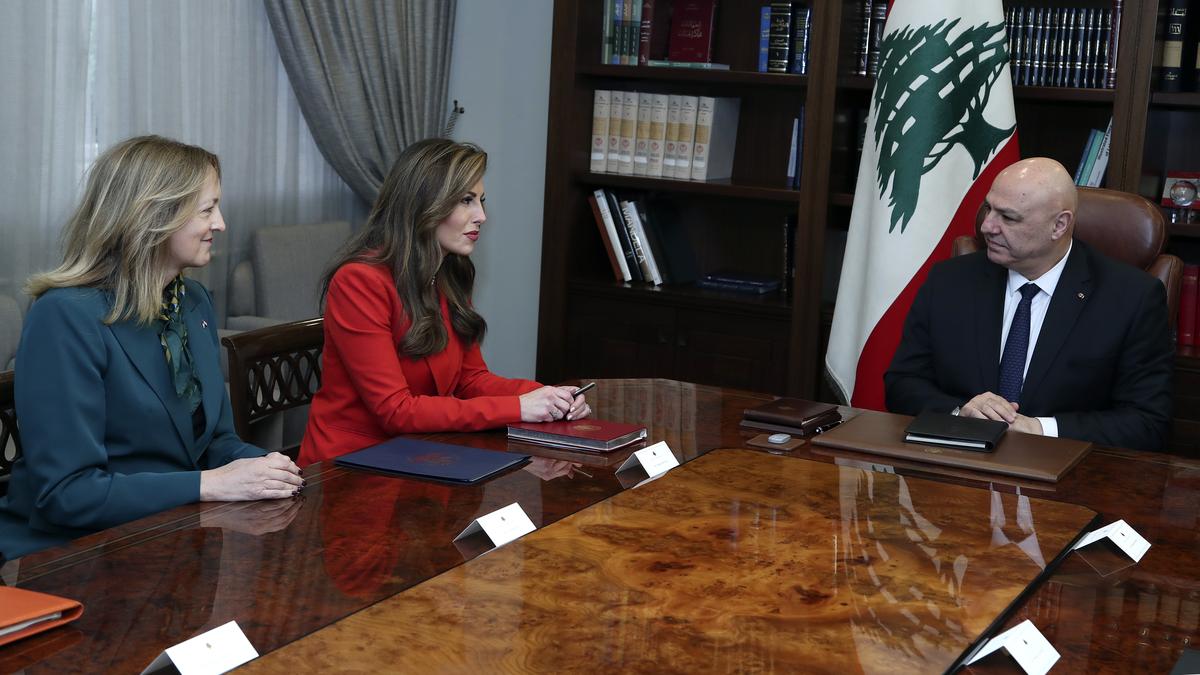In this photo released by the Lebanese Presidency press office, Lebanese President Joseph Aoun, right, meets with U.S. deputy special envoy for Middle East peace Morgan Ortagus, center, and U.S. Ambassador to Lebanon Lisa A. Johnson, in Baabda, Lebanon on February 7, 2025.
| Photo Credit: AP
A newly appointed U.S. envoy said Friday (February 7, 2025) that she hoped Lebanese authorities are committed to making sure that the Hezbollah militant group is not a part of the new government in any form.
Morgan Ortagus, a former State Department spokesperson and U.S. Navy Reserves officer, recently assumed the role of deputy special envoy for Middle East peace in Donald Trump’s administration, replacing Amos Hochstein, who helped broker the ceasefire that ended the 14-month war between Israel and Hezbollah.
“We are grateful to our ally Israel for defeating Hezbollah,” Ms. Ortagus said in a press conference, following a meeting with Lebanon’s President Joseph Aoun.
“It is thanks to the Lebanese President Aoun and the Prime Minister-designate Nawaf Salam and everyone in this government who is committed to an end of corruption, who is committed to reforms and who is committed to making sure that Hezbollah is not a part of the new government in any form.
“We have set clear red lines from the United States that (Hezbollah) won’t be able to terrorize the Lebanese people and that includes by being a part of the government,” she added.
In response, Lebanon’s presidency said in a statement on X: “Some of what was issued by the U.S. Deputy Envoy to the Middle East, Morgan Ortagus, from Baabda expresses her point of view, and the Presidency is not concerned with it.” Lebanese parliamentarians have named Nawaf Salam, a diplomat and former judge at the International Court of Justice, as Prime Minister-designate, tasking him with forming a government in a country that has been in caretaker mode since 2022.
Despite Salam’s stated commitment to forming a government, progress has stalled. Lebanon’s sectarian power-sharing system allocates key positions among Christian, Shiite and Sunni factions, with dominant blocs — Hezbollah and the Amal Movement for the Shiites, and the Lebanese Forces for the Christians — insisting on their share of ministerial portfolios.
Meanwhile, under the ceasefire agreement, the deadline for Israel’s troop withdrawal from southern Lebanon, initially set for January 26, was extended to February 18, while Hezbollah must retreat north of the Litani River — which serves as the boundary for a zone free of non-state armed groups.
Lebanese army troops and U.N. peacekeepers are to deploy in the area, but Israel has accused Lebanon of slow deployment, while Lebanon claims Israel’s delayed pullout has hindered its progress.
The ceasefire is overseen by a U.S.-led International Monitoring and Implementation Mechanism, comprising representatives from Israel, Lebanon, France, and the United Nations Interim Force in Lebanon (UNIFIL). Still, Lebanon has accused Israel of committing hundreds of ceasefire violations.
During Mr. Aoun and Ms. Ortagus’ meeting, an Israeli airstrike targeted Sidon province, well north of the Litani River. It was not immediately clear what was hit, and the Israeli army did not immediately comment.
On Thursday (February 6, 2025) evening, the Israeli military said it had struck “two military sites containing Hezbollah weapons, in violation of the ceasefire agreement”.
No casualties were reported from Friday’s (February 7, 2025) strike or from the series of airstrikes that hit eastern and southern Lebanon on Thursday (February 7, 2025).
Published – February 07, 2025 08:14 pm IST
